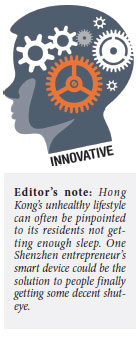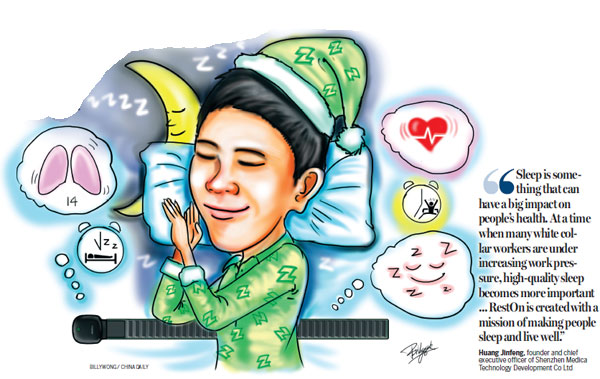Smart device awakens HK's sleep industry
Updated: 2016-12-01 07:24
By Zhou Mo in Shenzhen(HK Edition)
|
|||||||
In Hong Kong, a fast-paced city renowned for overtime work and bustling nightlife, sleep is considered a luxury. A good night's sleep can even be considered extravagant for those people who lie awake at night because of insomnia.
But Huang Jinfeng believes there should be a solution to the problem. He was one of China's first entrepreneurs to enter the smart sleeping sector and invented RestOn - the world's first non-wearable, sleep monitoring smart device.
Placed under the bed sheet, the belt-shaped device monitors users' sleep quality by gathering their heart rate, respiratory rate and sleeps stages. It then sends a health report based on the gathered data through its linked app.
Along with identifying any problems, it offers tips on how to address them and users are able to consult doctors online.
"Sleep is something that can have a big impact on people's health. At a time when many white collar workers are under increasing work pressure, high-quality sleep becomes more important," says Huang, founder and chief executive officer of Shenzhen Medica Technology Development Co Ltd.
"RestOn is created with a mission of making people sleep and live well."

Launched in July 2014, RestOn is now available in more than 60 countries and regions across the world, including the United States, Europe and Southeast Asia, with total sales volume reaching 180,000 units.
"The Chinese mainland is our biggest market," Huang says. "But we are also seeing strong sales in international markets, with overseas revenue accounting for 50 percent of the company's total."
The company made 40 million yuan ($5.8 million) in total sales revenue in 2015. Huang says the figure for this year is expected to double as it expands into more markets.
The product is expected to make its debut in Hong Kong later this month and will be available at stores like Broadway, Fortress and Studio A. Huang says the Hong Kong market presents many opportunities for the startup.
According to a 2016 survey by market research organization TNS, Hong Kong ranked last among 15 countries and regions across the Asia-Pacific in healthy living. This was a far cry from the mainland, which topped the list, and Macao (second).
The weak performance was attributed to the lack of sleep, insufficient sports and food imbalance among Hong Kong residents. They recorded an average of six-and-a-half hours of sleep per day - far less than the recommended eight hours.
A separate survey by the Hong Kong Society for Rehabilitation found nearly one-fifth of the Hong Kong population is suffering from insomnia.
In August 2015, Medica finished its Series B financing of 44 million yuan from home textile company Luolai and the country's second-largest e-commerce platform JD.com.
The company's latest B+ round financing was completed in the first half of this year, but Huang did not say who made the investment, and the amount it secured.
He stresses that the initial process of gaining trust from investors and consumers is difficult, as the 32-year-old set sail for entrepreneurship right after his graduation from Peking University with two other alumni.
The three dived into the smart sleeping sector in 2011 when there were few market players in China, launching a baby sleeping monitor that was met with a cold response from the market.
"Sales were sluggish at the time as most Chinese families sleep with their babies and do not need the product. We did not have any experience and overestimated market demand," Huang recalls.
"We also underestimated the difficulty of securing an efficient supply chain."
The company did not win the backing of any investor for the first three years, relying solely on its own capital and support from tutors and the government.
"Until 2013, we only had seven members. Now, we have become a 100-member team."
But, it's Huang's courage and perseverance that lay the groundwork for the company's growth at a time when competition in the industry intensifies with the introduction of more market players.
"Growing competition from rivals is a good thing. This means we are walking along the right path, and the market's future is bright. It will also stimulate us to further improve our products and services," he says.
sally@chinadailyhk.com

(HK Edition 12/01/2016 page9)